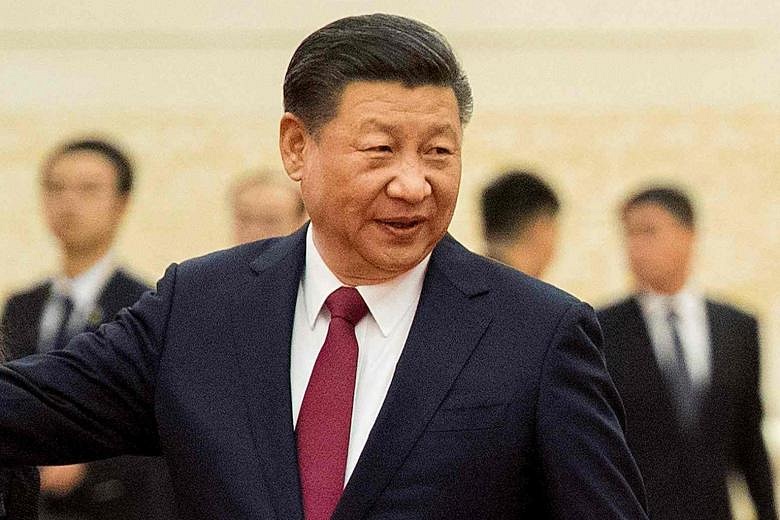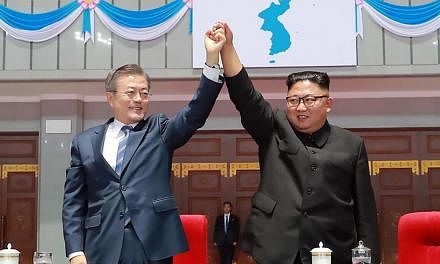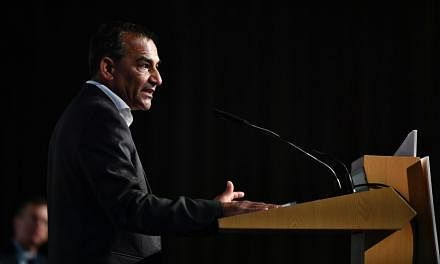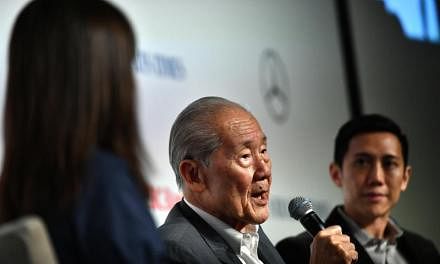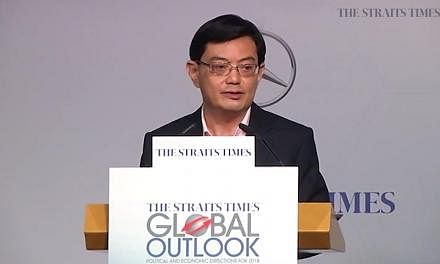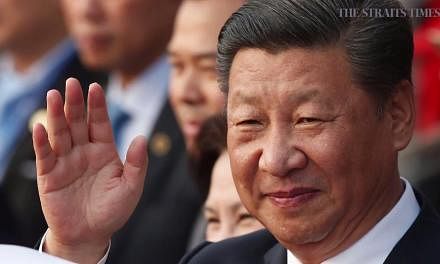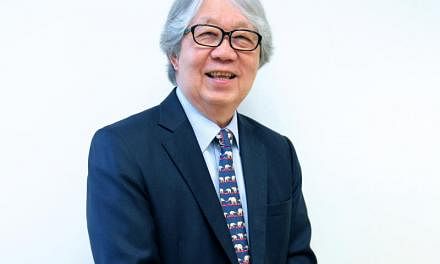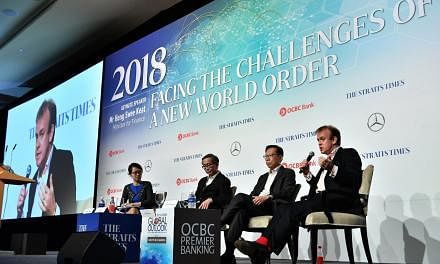Chinese President Xi Jinping, 64, who has just been given The Straits Times' Asian of the Year award, started 2017 with a bang. He spoke in support of free trade and globalisation at the World Economic Forum (WEF) in Davos in January that had many in the international audience cheering.
He told the world that China would not boost its trade competitiveness by devaluing its currency - as then US President-elect Donald Trump had charged during his campaign for the White House - and vowed to open up his country's markets further.
Coming as the United States signalled a turn inwards with Mr Trump's America First policy, the words of the leader of the world's second-largest economy and its key engine of growth were heartening.
"There is a vacuum when it comes to global economic leadership, and Xi Jinping is clearly aiming to fill it. With some success," former Swedish prime minister Carl Bildt tweeted.
Introducing the Chinese leader to the forum, WEF founder and chairman Klaus Schwab said: "In a world marked by great uncertainty and volatility, the world is looking to China."
Mr Xi did not disappoint at the WEF, nor did he at the United Nations in Geneva, which he visited the following day. He promised to honour China's commitment to the Paris Agreement on climate change, even as Mr Trump threatened to pull out of the accord.
-
ST's citation for Xi Jinping
-
The year 2017 has been one of major disruption and change, as events from previous years continued to play out. A major changing of the guard in the American presidency left many nations feeling cut loose from their traditional strategic moorings. The leading capitalist nation that once stood as a beacon for free trade and globalisation turned inwards with an America First policy.
Throughout the world, racked also by seismic changes in technology and the way people live and work, the crucial underpinnings of international society, and the cherished stability this has engendered, seemed to be under severe stress and strain.
Mr Xi Jinping, China's President and principal custodian of the world's second-largest economy and military force, has emerged as a crucial source of stability in a time of great uncertainty.
He has been a picture of calm, refined sobriety and steely determination, as well as an architect of a vision that soars beyond his nation of 1.3 billion people to encompass the Asian region and the wider world.
In January, at the World Economic Forum in Davos, President Xi made a landmark speech defending free trade and warning against protectionism. The very next day, in Geneva, he stoutly endorsed the Paris climate change accord, with the stirring idea that "mankind has only one homeland". His summit meeting with US President Donald Trump at Mar-a-Lago in April set the stage for a mature relationship between the superpowers.
The Belt and Road Initiative laid out his vision for a connected world, much of it underwritten by Chinese capital.
In October, his success in consolidating and enhancing his power, as evidenced in the conclusions of the 19th party congress, made plain his role in contributing to stability and progress at home as well as abroad.
The following month, China reiterated that it would like to negotiate a Code of Conduct in the South China Sea.
The recent success in brokering an agreement between Bangladesh and Myanmar on the complicated question of the Muslim Rohingya bespoke the influence China wields under his stewardship.
If he succeeds in achieving half of what he speaks about, Asia, and the world, will be transformed, and for the better. The China Dream could well be an Asia Dream.
Few Asian leaders have put such a stamp on their nation, neighbourhood or beyond, as Mr Xi has done this year. The editors of The Straits Times are unanimous in naming him the paper's Asian of the Year 2017.
In all this, Mr Xi has outlined a vision not just for his nation, but all of Asia too. It is a vision that, while grounded in domestic self-interest, can perhaps, with due care and consideration, be also used to benefit all in Asia and beyond.
The editors of The Straits Times, in selecting Mr Xi for this award, do so with the hope that he will be able to draw on the wisdom of China's rich civilisation and long history to present the world with a China that, while pursuing its self-interest, does so with patience, empathy, generosity and, above all, respect for the rule of law and fair play in international relations.
It is this that has prevented major conflicts since the end of World War II.
On the contrary, a mercantilist, aggressive and self-centred China would not only do injury to the rich tapestry of its heritage, but possibly also hold back its future promise as well as that of Asia, and the wider world.
The Asian of the Year Award, hence, is as much a recognition of the distance covered by Mr Xi thus far, as also the promise of taller peaks that remain to be ascended.
More than that, he made a global statesman-like call for the building of a "community of shared future for mankind".
"All countries should jointly shape the future of the world, write international rules, manage global affairs and ensure that development outcomes are shared by all," he said.
Later in April, Mr Xi sought to stabilise the most important bilateral relationship in the world, that between his country and the US, by paying a visit to Mr Trump in Mar-a-Lago, Florida.
The Chinese leader struck up a friendly relationship with his American counterpart that continued with their subsequent meetings, including one just last month in Beijing, where the Chinese pulled out all the stops in feting the US leader on his state visit.
The personal rapport between the two leaders has helped to give some stability to a complex relationship where wide differences exist, including over the North Korean nuclear crisis.
At home, Mr Xi consolidated power, culminating in his political thought being written into the ruling Chinese Communist Party's Constitution at the party's five-yearly national congress in October. His allies were also promoted to the Politburo and its Standing Committee, the apex decision-making body of the party.
Many now see him to be more powerful than his two predecessors, Mr Jiang Zemin and Mr Hu Jintao.
Mr Xi has made no bones about his mission, declaring early on just after taking over the party in 2012 that he was embarking on "the great rejuvenation of the Chinese nation".
He articulated this again in his work report to the party congress in October, saying that the goal was to make China a modern socialist country by 2050.
This meant, among other things, eradicating poverty, cleaning up the environment and moving towards the centre of the world stage.
Mr Xi is popular with the Chinese for launching a far-reaching anti-graft campaign, even though critics have seen it as part of an effort to weed out rivals.
There have been trade-offs in the push to modernise China. These include tighter media control and crackdowns on dissent, which observers hope will be eased as goals are achieved.
Mr Xi's China remains a different political system with a different set of values from the current Western-led world, and this has led to concerns about confrontation as it seeks to provide global leadership.
Still, Mr Xi has tried to bring some stability to a world fraught with uncertainty and shown a willingness to allow a new international order more to China's liking to evolve rather than disrupt the current one.
SEE EDITORIAL
